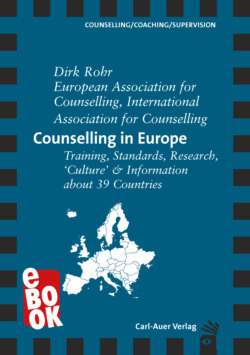Читать книгу Counselling in Europe - Dirk Rohr - Страница 11
На сайте Литреса книга снята с продажи.
2.4 Charter for Ethical Practice
ОглавлениеIntroduction
The general ethical framework for EAC members is based on a set of philosophical principles.
Organisational and individual members of the EAC are expected to adhere to this Charter. The text takes into account issues that can be foreseen in the Practice of Counselling. Each member has to devise and monitor specific standards and rules, which consider and respect existing laws and their country’s particular social and cultural norms. The principles outlined on these pages guide counselling and associated activities
Philosophical Principles
A counsellor’s values are based totally on respect for frequent human rights cultural differences.
The values underpin a set of attitudes and skills, especially regarding the client’s integrity, authority, and autonomy.
RESPECT is the unconditional acceptance of clients but not necessarily acceptance of all of their behaviour. Counsellors have a responsibility for making themselves aware of individual and cultural differences.
INTEGRITY honours the client’s right to maintain their physical and emotional boundaries and the right not to be exploited in any way.
AUTHORITY recognises that entering a counselling relationship is vested in the client whether the counselling is by direct or indirect assignment.
AUTONOMY acknowledges the client’s freedom to express themselves, their needs and their beliefs within the boundaries of a shared respect for universal human rights and individual and cultural differences.
PRIVACY protects the counselling relationship from uncontracted observation or inappropriate observation, interference or intrusion by others.
CONFIDENTIALITY respects personal information disclosed within a trust relationship and protected that information from inappropriate disclosure to others.
RESPONSIBILITY requires the counsellor to actively ensure the observance of the fundamental philosophical principles outlined above in the service provided through the counselling relationship.
COMPETENCE is the requirement for counsellors to ensure and maintain high standards of Practice in their work. Counsellors should provide only those services and use only those qualified techniques gained via education, training or experience.
Ethical Framework
In the counselling relationship, the counselling approach values the client’s integrity, authority, and autonomy, expressed in a skilled and professional way.
Counsellors are responsible for the quality of work they do with clients by:
• They are acting according to professional standards of competence.
• They are maintaining confidentiality.
• They are open and explicit with clients about the counselling process.
• They Engage only in activity in which they have the expertise and in which they can act independently and objectively.
• They are remaining within the boundaries of the counselling role.
• Ensure they receive adequate Supervision of the counselling work.
• They continue their own personal and professional development as Counsellors.
• They are establishing, maintaining and monitoring a clear counselling contract.
• Information disclosed during counselling typically remains confidential to that professional relationship except when otherwise negotiated.
Confidentiality is an essential ethical requirement, and without high levels of confidentiality, counselling may be frustrated by the client’s lack of trust and sense of safety. However, confidentiality is not absolute because counsellors need to consider the laws and the constraints of their society and their professional roles. Any limitations on confidentiality within the professional relationship should be made explicit at the time of contracting. Any subsequent conflicts with the principle of confidentiality must be handled clearly and openly with the client at the time of disclosure in a way that respects the client’s right to privacy and safety. In circumstances where a breach of confidentiality may be required, the counsellor should endeavour to secure the client’s written and informed consent.
Counsellors need to be open with themselves and with clients about the feasibility of working together in a professional relationship.
The professional relationship defined by an explicit and mutually agreed contract and ends with the contract’s termination. However, specific professional responsibilities continue beyond the termination of the contract.
These include, but are not limited to, the following:
• maintenance of agreed-upon confidentiality
• avoidance of any exploitation of the former relationship
• consideration of any needed follow-up care
Counsellors need to be clear about any responsibilities, including those outlined above, involved in the professional relationship, which may conflict with the client’s interests. Any duties to third parties must be explicit at the pre-counselling contract stage or as soon as they become a counselling factor. For example, a relationship can be the result of a counselling request by indirect assignment. In such cases, the counsellor needs to be explicit with both parties about the accountability involved to both the direct counselling client and the party requesting help, e. g. an employer who makes a request for counselling for an employee with burnout.
Research
Research into counselling should be by competent researchers who are familiar with the values of counselling. It requires full consideration of ethical issues and concern for the dignity and welfare of the participants. Researchers have a responsibility to behave in ways that are as consistent as possible with the core values of counselling. Research that violates those values is unethical. The fully informed consent of all parties is a fundamental ethical imperative in experimental research.
Conflicts between Ethical Principles
The complexity of ethical issues makes it likely that different moral principles and clauses within the Charter may cause specific circumstances. Sometimes, the Charter provisions may also clash with the expectations of, for example, Legal Professionals. By their very nature, the resolution of ethical dilemmas is not simple.
In particular, in cases when counsellors face a conflict between ethical principles, the intention should be to strive for the greatest good and the least harm for the client.
Members of EAC must comply with this Charter and must not work to lower ethical standards than those defined in this Charter. However, National Associations and Organisations are free to place higher stringent standards on their Nation-states members.
